- Home
- Donald McCaig
Rhett Butler's People Page 4
Rhett Butler's People Read online
Page 4
A big man on a big horse, Shadrach Watling watched from the levee.
At noon, the work gang paused for beans and cornmeal ladled from a common pot. Since Rhett didn’t have a bowl or spoon, he waited until another man finished to borrow his.
It was ninety-five degrees that first afternoon and red and purple flashes played across Rhett’s eyes.
By custom, after a worker finished his allotted task, his time was his own. By three o’clock some of the stronger men left the field and by five o’clock only two middle-aged women and Rhett were still working. At 8:30, when Rhett was done, he and Shad Watling remained.
“Best watch for snakes.” Shad grinned. “We lost a nigger in this patch last week.”
Rhett’s delirium of working, eating, and working again was relieved by fitful snatches of sleep. When Rhett did meet a water moccasin, he watched indifferently as the snake slithered past his bare legs.
On his tall, bony mule, Overseer Watling visited each of his gangs. The handle of the bullwhip hanging from his saddle bow was bleached from the sweat of his hand.
Despite the heat, the overseer wore a black frock coat and his shirt was buttoned to his chin. His wide-brimmed straw hat clasped his close-cropped skull.
At dinnertime on Saturday, he beckoned to Rhett.
Watling had big ears, a big nose, long arms, big hands; his face was lined with hard work and bitterness.
Watling laid his pale, empty gaze on Rhett. “When I was bankrupted and come to Broughton, many stretch flows past, you was an ornery child, but I believed there was hope for you. It is writ that by tribulations we shall one day rise. Young Butler”—the overseer started his mule—“our day will come.”
By the second week, Rhett worked as well as an old woman, and by the end of the third he could keep up with a negro boy of ten.
In the evenings, Rhett slumped on a chopping block in the dooryard. Although Broughton’s negroes had been told to shun him, they slipped him food from their own meager stores.
By September, young Rhett Butler was a full-task rice hand on Broughton Plantation.
As Carolina’s delegates were boarding the schooner for Baltimore and the Democratic party’s convention, Senator Wade Hampton took Langston Butler aside to ask about a rumor that Langston’s son was working beside negroes in the rice fields.
“My son wants discipline.”
Wade Hampton was a physical giant who owned 3,500 slaves. Now, he frowned.
Hampton explained the Democratic party could not afford a scandal.
“Sir, my son must have discipline.”
So Senator Wade Hampton arranged Rhett Butler’s appointment to West Point.
When Isaiah Watling rode into the quarters that evening, Rhett Butler was sitting cross-legged in the doorway of his cabin, watching rice birds wheel over the river.
Isaiah Watling dismounted. “Master Butler wants you in town,” he said. “Boat’s waitin’ at the landing.” After a pause, Watling added, “For a white boy, you was a pretty fair nigger.”
In Charleston, Rhett was bathed and barbered. His clothing was altered for his new musculature. Before all his insect bites had healed, Rhett boarded a northbound schooner.
Young Rhett Butler stood at the rail as the schooner cleared Charleston harbor. He should have been excited about his prospects, but he wasn’t. His body didn’t feel right in gentleman’s clothing. Fort Sumter grew smaller and smaller, until it was a dot on the gray ocean.
CHAPTER TWO
Rosemary Penelope Butler
Rhett’s sister, Rosemary, was four years old when Rhett left the Low Country, and afterward, when the child tried to remember her brother, no matter where she tried to force her thoughts, an image crept into her mind: the wolf on the front of her fairy-tale book. The wolf was long-snouted and scraggly, but how sly and what big teeth!
Those weeks Rhett was hidden by the Bonneaus, Langston Butler’s anger filled every nook and cranny of the Charleston town house. Servants tiptoed, little Rosemary hid in the nursery, and Elizabeth Butler retired to her bedroom with a sick headache. Rosemary thought Rhett must be powerful and very wicked, since her father hated him so.
Rashes erupted on Rosemary’s arms and legs. She woke at the least sound and couldn’t get back to sleep. If she just didn’t think about that scraggly wolf, if she could picture dolls or dancers or pretty dresses, that wolf wasn’t lurking in the dark shadows beneath her bedroom window and couldn’t be hiding under her bed.
Rosemary’s mother, Elizabeth, had been the beloved only daughter of the very wealthy Ezra Ball Kershaw. A dutiful, pious wife, Elizabeth trusted the Bible to answer her questions and provide eventual justice. She prayed for her children and, without mentioning it to him, she prayed for her husband. Now, Elizabeth Butler took uncharacteristically bold action and asked her friend Constance Fisher—nobody in Charleston was more respectable, or richer, than Grandmother Fisher—if Rosemary might visit the Fishers for a time.
Grandmother promptly agreed. “Rosemary and my granddaughter Charlotte will keep each other occupied.”
That afternoon, Rosemary’s clothes and favorite dolls were packed and loaded in Grandmother Fisher’s carriage. Afterward, Rosemary slept more nights in the Fishers’ East Bay mansion than in her own home. Her rashes disappeared.
Little Charlotte Fisher was a serene, uncomplaining child who thought the best of everyone. Charlotte believed Rosemary’s brother couldn’t be that bad. Nobody was that bad. Charlotte never complained when her older brother, Jamie, teased her. One afternoon when Rosemary was out of sorts, she snatched Charlotte’s favorite doll. Charlotte wouldn’t take it back when Rosemary repented. Weeping, Rosemary threw her arms around her friend’s neck. “Charlotte, I’m sorry, but when I want something, I want it now.”
Three years after Rhett left for West Point, Charlotte’s brother, Jamie, burst into the family room.
Charlotte closed her book on her finger and sighed. “Yes, brother …”
“Yes, yourself.” Arms folded, Jamie leaned against a sofa arm so he wouldn’t crease his trousers.
“Jamie…”
“Rhett Butler’s been expelled,” Jamie blurted. “He’s back in Charleston, though heaven knows why.” Jamie raised his eyebrows theatrically. “I mean, nobody—absolutely nobody—will receive him. He’s living with Old Jack Ravanel. He and Andrew always were thick as thieves.”
Rosemary frowned. “What’s ‘expelled’?”
“Thrown out of West Point. Exiled. Entirely and totally disgraced!”
Rosemary felt sad. How can a wolf not be a wolf? she wondered.
Hastily, Jamie added, “You mustn’t worry, Rosemary. Your brother has lots of friends. Andrew and there’s Henry Kershaw, Edgar Puryear—the, uh… that crowd.”
Which was not reassuring. Jamie had previously regaled the Fishers’ supper table with tales about “the Flash Sports.” Everything Rosemary had heard about these young men was wicked or alarming.
That evening, Grandmother Fisher scolded Jamie for upsetting the child.
“But Rhett is disgraced. It’s true,” Jamie insisted.
“The truth, Jamie, isn’t always kind.”
Rhett Butler’s reappearance inspired the Flash Sports to new outrages. Somehow, Rhett slipped two of Miss Polly’s pretty, overdressed young Cyprians past the ball managers into the Jockey Club Ball. Before they were escorted out, the giggling girls recognized a St. Michael’s vestryman of previously impeccable reputation.
One midnight outside a waterfront gambling hell, two ruffians accosted Rhett.
Rhett said mildly, “I’ve only one bullet in my pistol. Who wants the bullet and who wants his neck broken?”
The thieves backed down.
Rhett and Andrew brought a dozen horses from Tennessee to Charleston in four days, changing horses on the fly. Rumor persisted they’d barely outrun the horses’ legitimate owners.
And all Charleston buzzed when, on a two-dollar bet, the blindfolded Rhett Butl
er jumped his gelding, Tecumseh, over the five-foot spiked iron fence into St. Michael’s churchyard. Sunday morning, curious parishioners and an angry vicar inspected the deep holes Tecumseh’s hooves had left in the turf. Knowledgeable horsemen shuddered.
Jamie Fisher had a better heart than he liked to admit and he censored that news. “Rhett plays poker,” Jamie stated. He lowered his voice to a whisper. “He plays for money!”
“Of course he does,” sensible Charlotte retorted. “He has to get money somehow, doesn’t he?”
Although the girls didn’t know all Rhett’s sins, they knew his sins were very numerous. One morning, when the sympathetic Charlotte called her friend “poor, dear Rosemary” once too often, Rosemary smacked her friend in the eye. The startled child burst into tears and Rosemary fell into her arms and, as little girls will, they solaced one another.
One special morning, when Grandmother Fisher entered the family room, Charlotte forgot the toast she had been slathering with red currant jelly and Rosemary set her teacup down.
Grandmother Fisher was not quite wringing her hands. She studied Rosemary as if the child’s demeanor might answer some question.
“Grandmother,” Charlotte asked, “is anything wrong?”
Constance Fisher shook her head—a little shake—and straightened. “Rosemary, you’ve a caller in the withdrawing room.”
“A caller, Grandmother? For me?”
“Your brother Rhett has come for you.”
That story-book wolf flashed into Rosemary’s mind and she glanced at Charlotte in alarm.
Grandmother said, “You are not obliged to see him, child. If you prefer, I’ll turn him away.”
“Rosemary, he’s disgraced,” Charlotte fretted.
Rosemary set her lips in a determined line. She was old enough now to face a story-book wolf. Besides, Rosemary was curious: Would her brother’s sins show in his person? Would he be hunchbacked, or hairy, with long fingernails? Would he smell bad?
As they passed down the hall, Grandmother murmured, “Rosemary, you mustn’t mention this visit to your father.”
Rhett Butler wasn’t a scraggly old wolf. He was young and tall and his black hair glittered like a raven’s wing. His coat was the russet of a newborn fawn and his black planter’s hat rested in his big hands like an old friend.
“Who have we here?” her brother asked. “You needn’t be afraid of me, little one.”
When Rosemary looked into Rhett’s smiling eyes, the wolf went away forever. “I’m not afraid,” she said stoutly.
“Grandmother Fisher told me you’re a spark,” Rhett told her. “I believe you are. I’ve come this morning to take you for a drive.”
“Young Butler, I may live to regret this. How in the world you managed to get expelled from West Point, I don’t know”—Grandmother raised a preemptory hand—“and do not wish to know. But John Haynes speaks well of you, and John has a level head. If your father hears you’ve been here, he’ll be …”
Rhett grinned. “Outraged? Outrage is my father’s dearest companion.” Rhett’s bow was deferential. “I am indebted to you, Grandmother Fisher. I’ll have Rosemary home for supper.” He knelt then so he was no taller than she. “Sister Rosemary, I’ve a spirited horse and the lightest sulky in the Low Country. Wouldn’t you like to fly?”
That afternoon, Rosemary met Tecumseh, Rhett’s three-year-old Morgan gelding. The sulky was not much more than a woven cane seat on tall wheels whose spokes were thinner than Rhett’s thumbs. Tecumseh floated along at a trot, and when Rhett Butler asked for the gallop, their sulky left the ground.
When Rosemary’d flown about as long as a little girl should fly, Rhett returned her to Grandmother Fisher’s and carried her into the house. Rosemary had never felt as safe as she felt in her brother’s arms.
On his second visit, Rhett took Rosemary boating. Everyone in the harbor seemed to know him. The sloop they boarded belonged to a free colored man who called her brother by his Christian name. Rosemary was surprised when her brother clasped a negro’s hand.
Charleston harbor was busy that afternoon with fishing boats, coastal ketches, and oceangoing schooners. With Old Glory snapping from its parapet, Fort Sumter guarded the harbor mouth. The waves were higher outside the harbor, and Rosemary got thoroughly wetted with spray.
When they returned to Grandmother Fisher’s, Rosemary was sunburned, tired, and thoughtful.
“What is it, little one?”
“Rhett, do you love me?”
Her brother touched her cheek. “As my life.”
Inevitably, Langston learned his son had visited the Fishers, and he removed Rosemary to Broughton. A month later, Rosemary was roused after midnight by a carriage in the drive—Grandmother Fisher’s carriage—and before she was fully awake, Charlotte was in her bedroom and in her arms. “Oh, Rosemary,” she said. “I’m so sorry this is happening.”
Which is when Rosemary Butler learned that her brother Rhett was to fight at daybreak, a duel with Shadrach Watling, who once shot a whippoorwill’s head from its body.
Daybreak came and went. At the sound of distant shots, Rhett’s mother rushed to the withdrawing room window, peering with myopic, blinking intensity.
“Probably market hunters,” Rhett’s brother, Julian, announced. “Shooting passenger pigeons.” Dr. Ward’s wife, Eulalie, nodded in agreement.
Charlotte Fisher’s warm hand found Rosemary’s cold one and squeezed it hard.
Color flushing her ashen cheeks, Elizabeth Butler rang for a servant. “We will take refreshment.”
Rosemary closed her eyes so tightly, red spots flashed behind her eyelids as she prayed silently, Please God, keep my brother safe. Please God. Make Rhett safe!
Quiet as church mice, concealed behind a love seat’s curving arm, Rosemary and Charlotte were in the farthest corner of the big, chilly room.
Constance Venable Fisher cleared her throat to issue an opinion. “Langston has chosen a singularly unfortunate time to do his accounts!” Mrs. Fisher’s judgmental nod bored through the withdrawing room door, marched down the hall, down the grand staircase, through the public parlor into Langston Butler’s office.
Julian replied, “Father is a man of regular habits. Saturday mornings, he does accounts.”
Seated on the hard upright chair she had taken as the spinster’s due, Miss Juliet Ravanel said, “Sometimes men conceal their fears by punctiliousness. Perhaps Mr. Butler—”
“Nonsense!” Constance Fisher pronounced. “Langston Butler is stubborn as a root hog.”
Uncle Solomon, Broughton’s houseman, brought tea and a platter heaped with the ginger cookies Cook usually baked only during Race Week. When Mrs. Butler asked for sherry, Uncle Solomon replied, “But Missus, it ain’t hardly day. Sun just comin’ up.”
“We will take sherry,” Mrs. Butler insisted. After Solomon shut the door too noisily, she said, “As Mr. Butler says, ‘Negroes take advantage of their masters’ kindness.’”
“Everyone recalls how the Butlers kept slavery in the United States Constitution.” Miss Ravanel refreshed a boast with which everyone present was all too familiar. Mrs. Butler took her bait. “Why, yes. My husband’s beloved uncle Middleton headed the South Carolina delegation ….”
“Yes, dear,” Constance Fisher said, not unkindly. “We know all that. Rhett is nothing like Middleton. Rhett favors his grandfather Louis Valentine.”
Elizabeth Butler put a hand to her mouth. “We mustn’t speak of him. Langston never mentions his father’s name.”
“Dear me, why ever not?” Constance Fisher said cheerfully. “America is a new nation. Blood money is scrubbed clean in a generation.”
Broughton had been an unprofitable indigo plantation that couldn’t provide for the brothers who’d inherited it. Louis Valentine Butler took himself off to New Orleans and a lifelong association with buccaneer Jean Lafitte, while Middleton Butler entered the slave trade. Fortunes were being made importing Africans, but Middleton’s captain
s paid too much for sickly specimens and his negroes who survived the Middle Passage were discounted at the sales. Middleton quit the business when Charleston’s council ordered him to dump dead negroes farther out to sea. Corpses were washing ashore at White Point, where Charleston’s gentry took Sabbath promenades.
Since Middleton Butler didn’t choose sides until the American Revolution was safely won, he acquired three hundred Loyalist acres forfeited to patriots. As a delegate to the Philadelphia convention, Middleton Butler did keep slavery in the newly minted Constitution.
In 1810, Louis Valentine Butler captured the Mercato, a Spanish silver ship, off Tampico and bought a thousand acres of prime rice land for Broughton. Langston Butler, Louis Valentine’s son, quarreled fiercely with his father and moved in with his bachelor uncle, Middleton. Louis Valentine bought two thousand more acres. The purchase money came from prizes taken off the Texas coast. (Although Louis Valentine swore they’d been Spanish and Mexican ships, rumor persisted they’d been flying the American flag.)
Successive Broughton overseers were hard-pressed to support Middleton’s extravagant Charleston establishment.
One bright morning in 1825, Louis Valentine Butler sailed from Galveston in The Pride of Charleston, and was never seen again. Later that year, Middleton Butler’s creditors attended that gentleman’s funeral, paying homage to an American patriot while seeking their due from Langston Butler, the Butler heir. Langston Butler sold two hundred slaves to satisfy creditors’ claims and married fifteen-year-old Elizabeth Kershaw. Miss Elizabeth was notable for her piety and plain features.
When Elizabeth Butler’s firstborn, Rhett Kershaw Butler, emerged into the world, the infant had his caul clenched in his fist, a circumstance Broughton’s conjure men said was an unusual, powerful omen. Whether for good or ill, they wouldn’t say.
Although the African slave trade had been outlawed two decades before, slave ships sometimes slipped into Charleston harbor, and Langston Butler was a willing buyer of Angolans, Coromantees, Gambians, and Ebos: coastal Africans resistant to fevers and familiar with rice production. He completed Broughton Plantation with two thousand acres from Colonel Ravanel (who was too despondent after his wife’s death to drive a hard bargain).

 Eminent Dogs, Dangerous Men: Searching Through Scotland for a Border Collie
Eminent Dogs, Dangerous Men: Searching Through Scotland for a Border Collie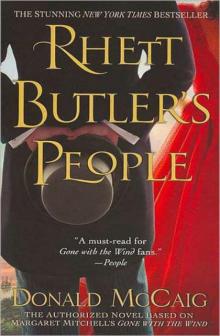 Rhett Butler's People
Rhett Butler's People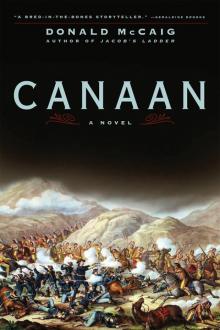 Canaan
Canaan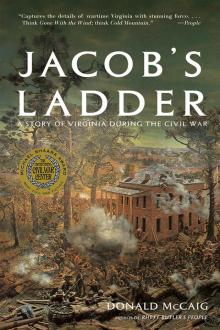 Jacob's Ladder: A Story of Virginia During the War
Jacob's Ladder: A Story of Virginia During the War Nop's Hope
Nop's Hope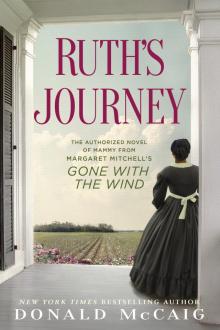 Ruth's Journey: The Authorized Novel of Mammy From Margaret Mitchell's Gone With the Wind
Ruth's Journey: The Authorized Novel of Mammy From Margaret Mitchell's Gone With the Wind Nop's Trials
Nop's Trials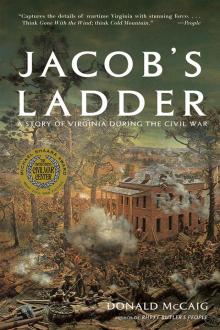 Jacob's Ladder
Jacob's Ladder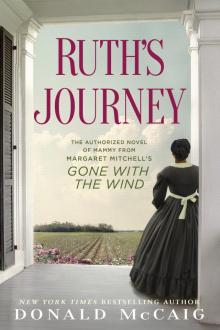 Ruth’s Journey
Ruth’s Journey Eminent Dogs, Dangerous Men
Eminent Dogs, Dangerous Men